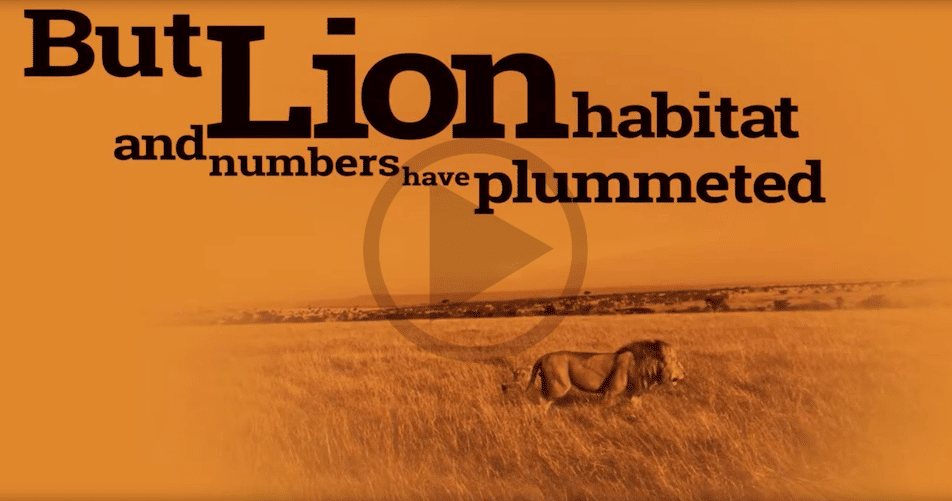Landscapes supporting lions on average provide more critical ecosystem services – the benefits that humans receive from healthy ecosystems – than other parts of Africa. Yet these services are at risk of disappearing. The New Lion Economy explores a new approach to conservation and economic development and calls for investment in ecosystem services to support both humans and lions.
Lions are iconic species. Yet populations are collapsing and lions have already disappeared from many African countries. In a drive to build economies and eliminate poverty, governments are reluctant to spend money on conservation. This new report from Equilibrium Research, commissioned by the Lion Recovery Fund for World Lion Day 2019, shows that:
- Lions directly support ecosystem services by attracting tourists worth millions of dollars annually.
- Lion conservation supports other ecosystem services by maintaining water sources vital for drinking water and power; supporting food security; storing carbon to mitigate climate change; and protecting communities against weather-related disasters.
- Lions also have important livelihood, cultural and spiritual values being at the heart of African culture.
- Lions generate economic benefits and attract new revenue, through a better understanding of ecosystem services, which can help conservationists and communities access diverse funding streams, supporting livelihoods, sustainable development and lions.
As Kaddu Kiwe Sebunya, Chief Executive Officer African Wildlife Foundation, states in the report’s foreword: “Investing in lion conservation is not simply a charitable act that might protect populations of one particularly species, however important. It also protects the many commercial and subsistence values that rely on lions directly, or that rely on the landscapes where lions live, and come as a no-cost extra to conservation.”
If Africa is to retain its biodiversity, support a rapidly expanding human population and a growing economy, decision makers need to maintain ecosystem services as essential life-support mechanisms. Unlocking the value of lions and their landscapes can contribute to these aims.
As well as describing the wider benefits from lion landscapes, The New Lion Economy stresses the need to measure and better communicate the value of ecosystem services; rebuild ecosystem services to improve food, water and human security; and use the market for ecosystem services to support conservation and development throughout the lion range. Policy makers should consider these benefits in development planning and help create business models that support both ecosystem services and lions, and reflect the needs of human communities. Governments and international donors can help by investing in lion conservation and restoring lion populations as indicators of healthy ecosystem services.
By taking these steps the new lion economy – where lion populations grow along with a whole range of additional benefits – will be a reality.
Notes
World Lion Day is held annually on August 10th. This campaign aims to bring people together globally to pay tribute to the lion and raise awareness of the issues facing lion conservation.
Ecosystem services include any benefits that humans gain from the natural environment and from healthy, properly-functioning ecosystems. These range from the basic ecological functions that keep life going – such as photosynthesis and nutrient cycling – through the provision of food, water, grazing land, forestry, medicines and other materials, various regulatory functions like coastal protection and reducing the impacts of climate change, and include cultural and spiritual benefits such as tourism, the recreational and aesthetic values of ecosystems, and their importance to faith groups.
Lion populations have disappeared from 92% of their historical range and numbers have declined from perhaps 200,000 a hundred years ago to as few as 20,000 today.
Lion Recovery Fund (LRF) was created by the Wildlife Conservation Network in partnership with the Leonardo DiCaprio Foundation to double the number of lions in Africa, regaining those lions lost over the past 25 years. In recovering lions, the LRF also aims to restore the health of their landscapes and all that they provide for local people and wildlife. The LRF sends 100% of donations directly to projects that conserve lions, investing in the best ideas for lion recovery, and supporting projects beyond any singular country across lions’ entire range.
Contacts: Sue Stolton (sue@equilibriumresearch.com, +44-793-306-7445) and Nigel Dudley (nigel@equilibriumresearch.com, +44-773-454-1913)


